Top
## 2024 {#2024}
### January-August 2024
#### August 28-31, 2024: "Animal Associations in Human burials: Insights from Tell Mozan (Middle Bronze Age, Northern Syria)" {#EAA_2024_Kharobi TO="animals; human burials" data-toc-label="Aug. 28-31, 2024: EAA 2024 -- Kharobi"}
Our collaborator Arwa Kharobi participated, between 28 and 31 August 2024, in Rome, at the "XXX Conference of the European Association of Archaeologists", presenting a paper (co-authored with Giorgio Buccellati, Marilyn Kelly-Buccellati and Federico Buccellati) entitled "Animal Associations in Human burials: Insights from Tell Mozan (Middle Bronze Age, Northern Syria)".
An abstract of her paper is available at this link. |
|
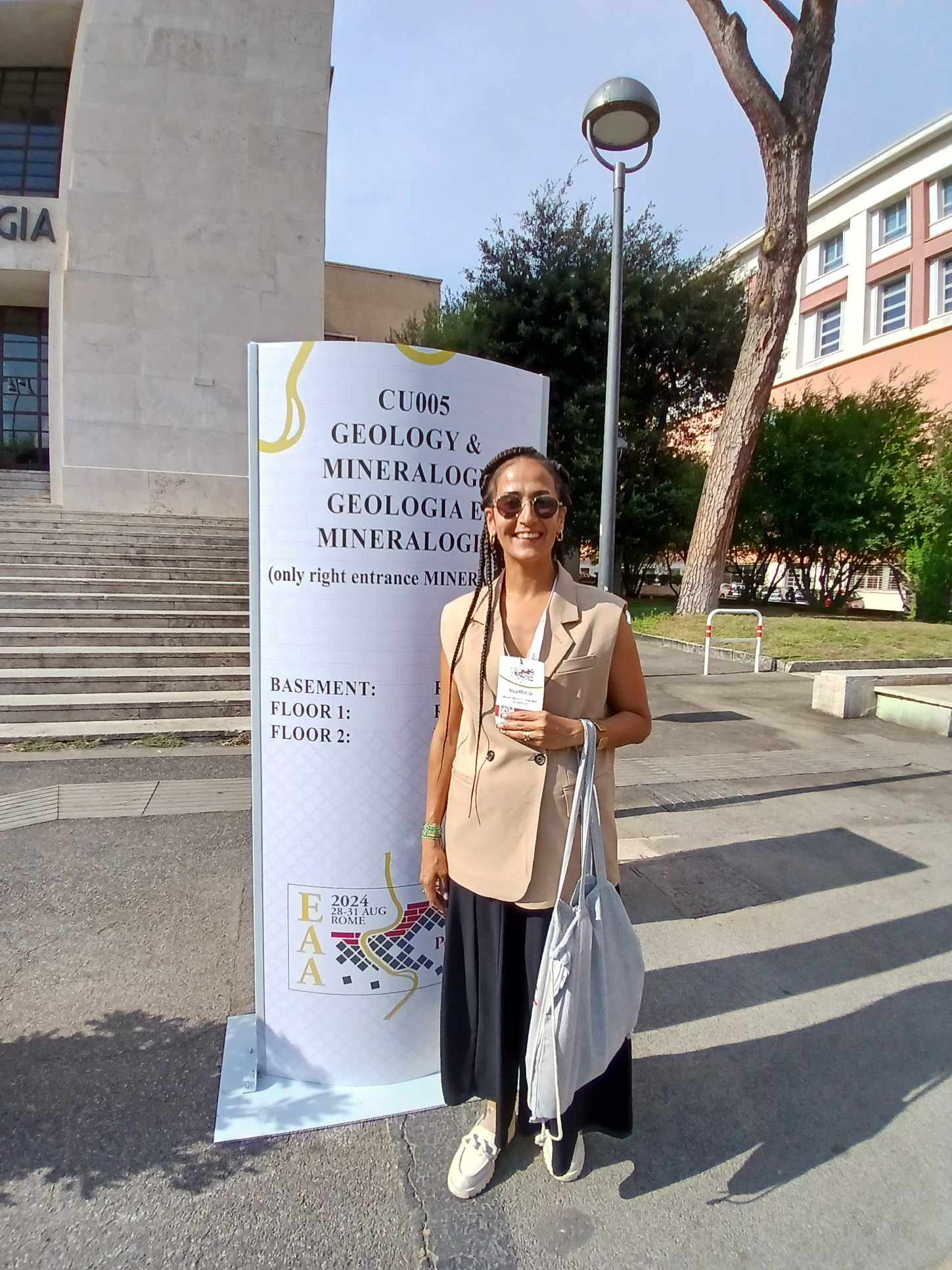
|
#### August 28-31, 2024: "Georgian Monasteries between invasion and resilience during Middle Ages" {#EAA_2024_mKB TO="Georgia" data-toc-label="Aug. 28-31, 2024: EAA 2024 -- Georgia"}
As a continuation of the IIMAS research activities in the Republic of Georgia we have helped fund a research project conducted at the Borjomi Monastery of the Nativity of the Mother of God, Potoleti Church and Green Monastery. This research included a survey of the skeletal material discovered by Georgian anthropologists comprising a large number of human skulls and teeth; by analyzing the teeth and applying new methods a more precise age span could be determined.
The flyer of the conference can be found at this link. |
|

|
#### May 8, 2024: Lecture by G. Buccellati and M. Kelly-Buccellati: "The Urkesh Extended Project: Community archaeology and digital discourse" {#ZI508_Alcalà TO="Urkesh Extended Project; community archaeology; digital discourse; Madrid" data-toc-label="May 8, 2024: Alcalà de Henares"}
On Wednesday, May 8, Giorgio Buccellati and Marilyn Kelly-Buccellati will deliver a conference in Alcalà de Henares (Madrid); the title of their conference is "The Urkesh Extended Project: Community archaeology and digital discourse".
The flyer with the program of the conference can be found at this link. |
|
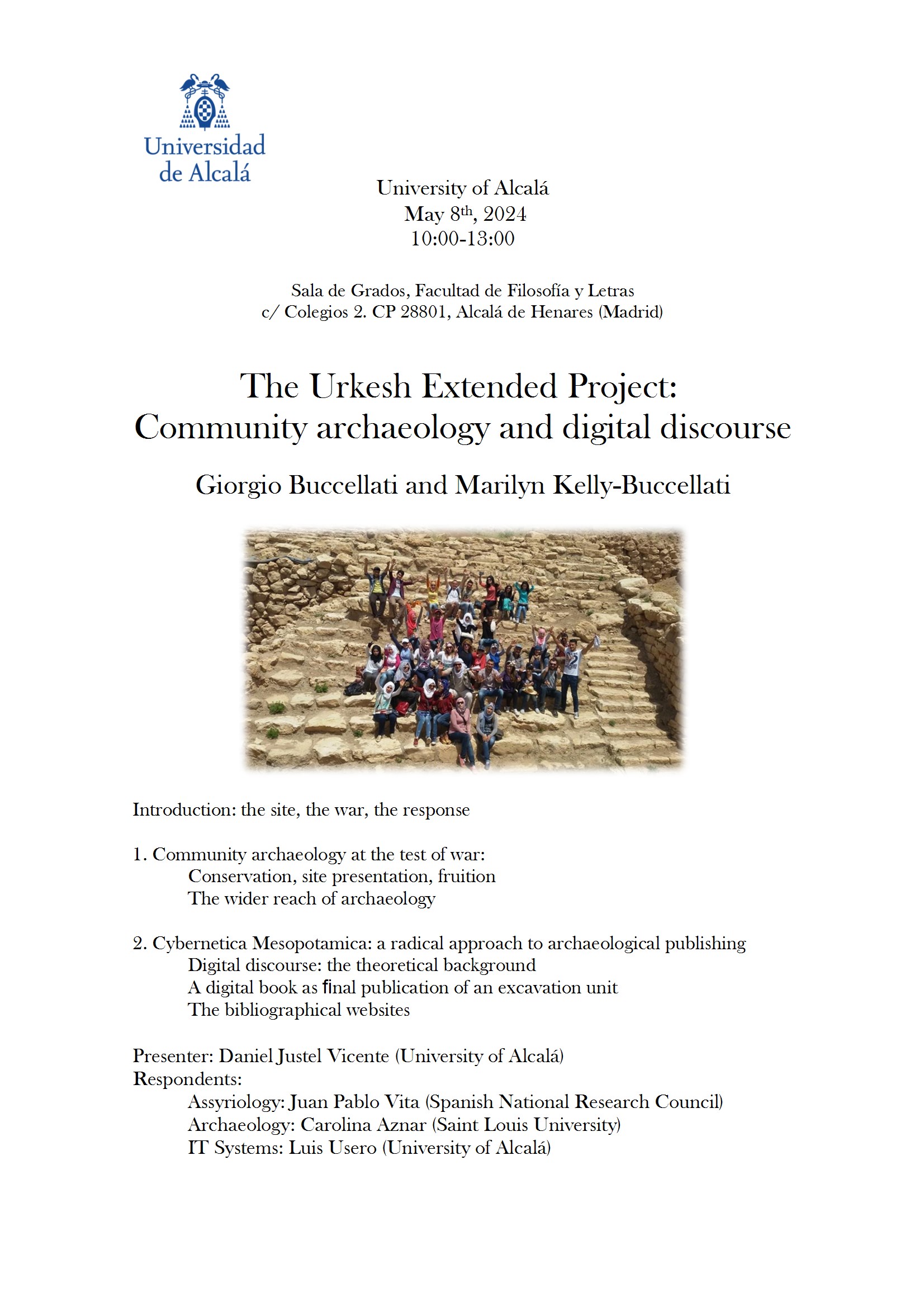
|
#### March 27, 2024: Seminar by G. Buccellati and Cornelius Holtorf at the Getty Conservation Institute: "Urkesh and The Book of Change Seminar" {#ZI327_Conference TO="The Book of Change Seminar;
Getty Conservation Institute" data-toc-label="March 27, 2024: GCI"}
On Wednesday, March 27, 2024, from 11:00 AM to 1:00 PM (Los Angeles time), an informal seminar will be hosted by GCI Scholars Giorgio Buccellati and Cornelius Holtorf and based on their Scholar lectures.
The meeting will be held in the Visitor Services Conference Room on L3 of the East Building, as well as via Zoom. Please see the attached map for directions to the conference room.
The Zoom link to attend the seminar from remote can be found here. |
|
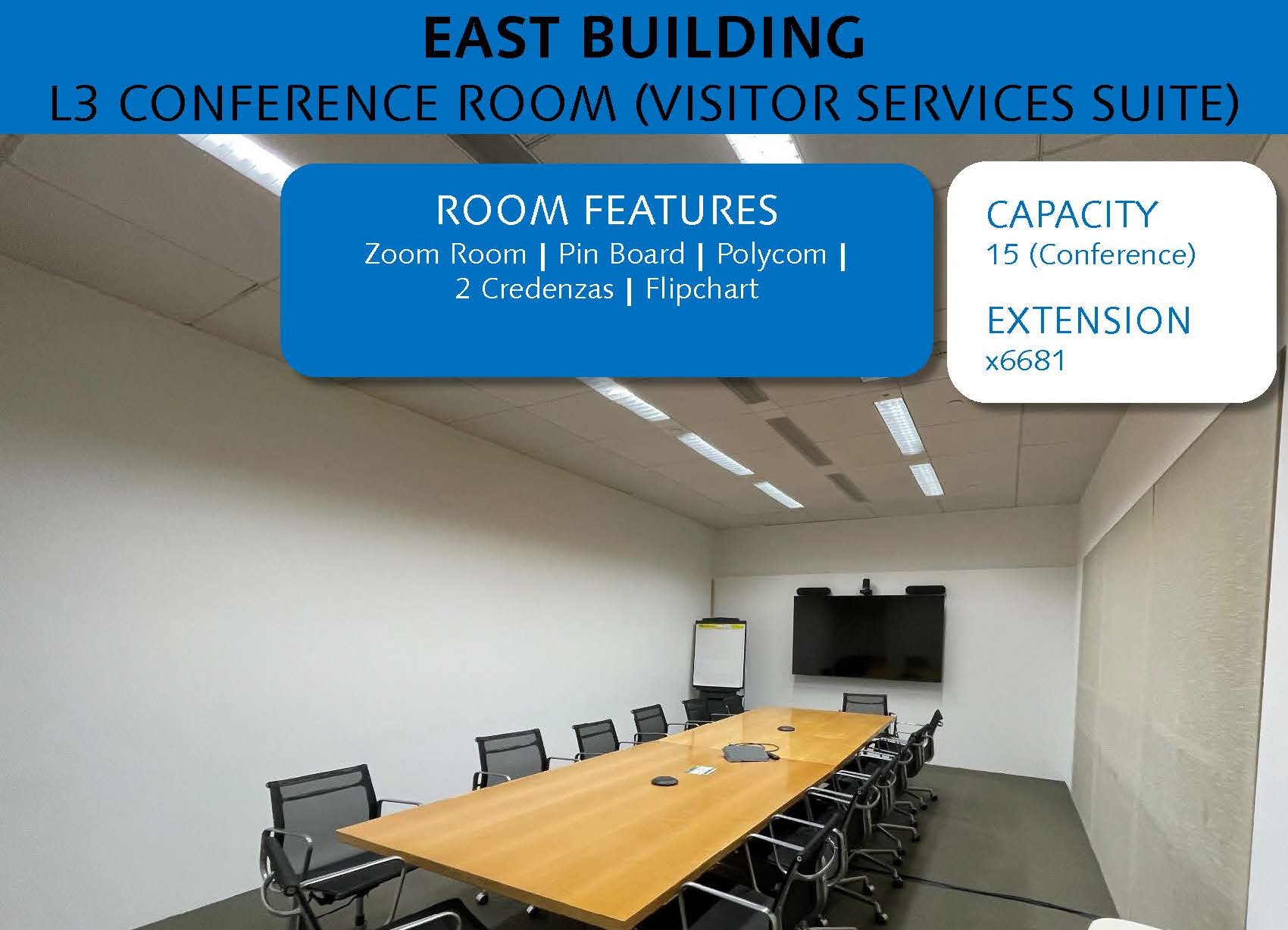
|
#### March 13, 2024: Lecture of G. Buccellati at the Getty Conservation Institute
"The Pride of Lost Heritage: An Integrated Preservation Approach at Ancient Urkesh, Syria" {#ZI313_GCI TO="
Getty Conservation Institute; pride; heritage" data-toc-label="March 13, 2024: GCI"}
On Wednesday, March 13, 2024, at 3:00 PM (PT) = 23:00 (CET), Giorgio Buccellati delivers a lecture at the Getty Conservation Institute, in the Ada Louise Huxtable Lecture Hall (GRI) and via Zoom.
The lecture is entitled "The Pride of Lost Heritage: An Integrated Preservation Approach at Ancient Urkesh, Syria.
A brief abstract of this lecture along with a profile of the lecturer can be read hereafter.
A useful handout which will be discussed during the lecture is available at this link.
The Zoom link to attend the lecture from remote (passcode 502735) can be found here.
Urkesh is the name of one of the first cities in history: it started around 4000 B.C. and it 'died out' around 1200 B.C. How does a city 'die'? When it is completely abandoned, in which case, in an environment like that of today's northeastern Syria, it turns into a hillock, a 'tell' as is known in Arabic. In 1984 Urkesh was just that, a tell. How do you reinsert the now dead city into the consciousness of the 'stakeholders'? My work at the Getty aims to provide an answer with three parallel publications: 1) A printed volume providing the overall framework, in five parts (Theory, Excavations, Conservation, Site Presentation, and Heritage Outreach); 2) a technical website providing full details of the data from Urkesh, including, for example, the monitoring of some 400 linear meters of mud brick walls; and 3) a bibliographical website providing extensive coverage of the literature on the five parts of the printed volume.
Giorgio Buccellati is Professor Emeritus in the Department of Near Eastern Languages and Cultures and in the Department of History at UCLA. He founded the Institute of Archaeology at UCLA, of which he served as first director from 1973 until 1983 and where he is now Director of the Mesopotamian Lab. He is currently Director of IIMAS – The International Institute for Mesopotamian Area Studies. His research interests include the ancient languages, literature, religion, archaeology and history of Mesopotamia, and the theory of archaeology. His publications include site reports, text editions, linguistic and literary studies, historical monographs and essays on the theory of archaeology. He has developed new approaches to the preservation and presentation of archaeological sites and to community archaeology. He has spearheaded the Urkesh Extended Project, responding to the crisis of the war in Syria. As a Guggenheim Fellow, he has traveled to Syria to study ethnography and geography relating to the history of the ancient Amorites. In 2021, he was a co-winner with his wife, Marilyn Kelly-Buccellati, of the Balzan Prize, which resulted in the Cybernetica Mesopotamica project devoted to a study of primary and secondary material relating to ancient Mesopotamia applying the 'digital discourse' theoretical approach. |
|
 The Urkesh Royal Palace of Tupkish
The Urkesh Royal Palace of Tupkish
(2250 B.C.)
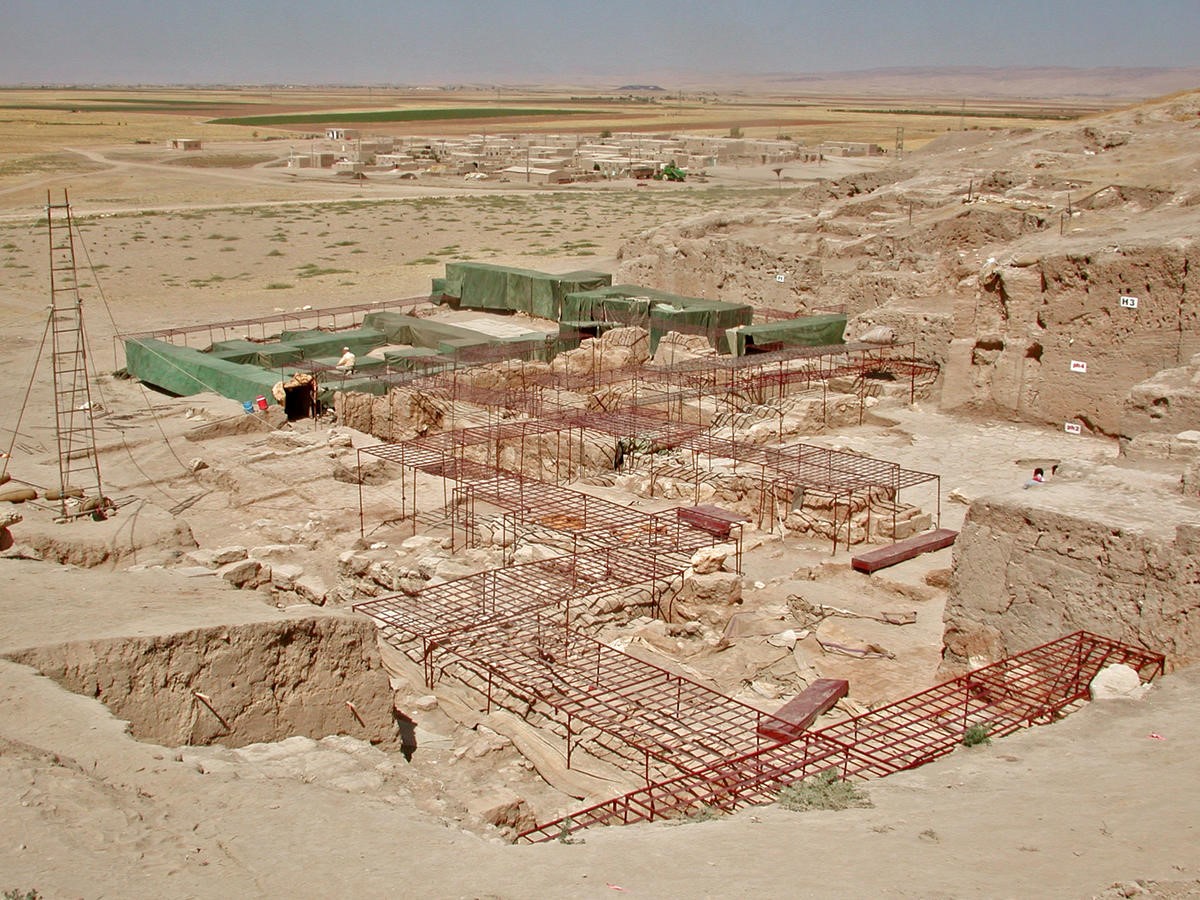 The Urkesh model of mud brick
The Urkesh model of mud brick
wall conservation: the Royal Palace
 A map of the Royal Palace
A map of the Royal Palace
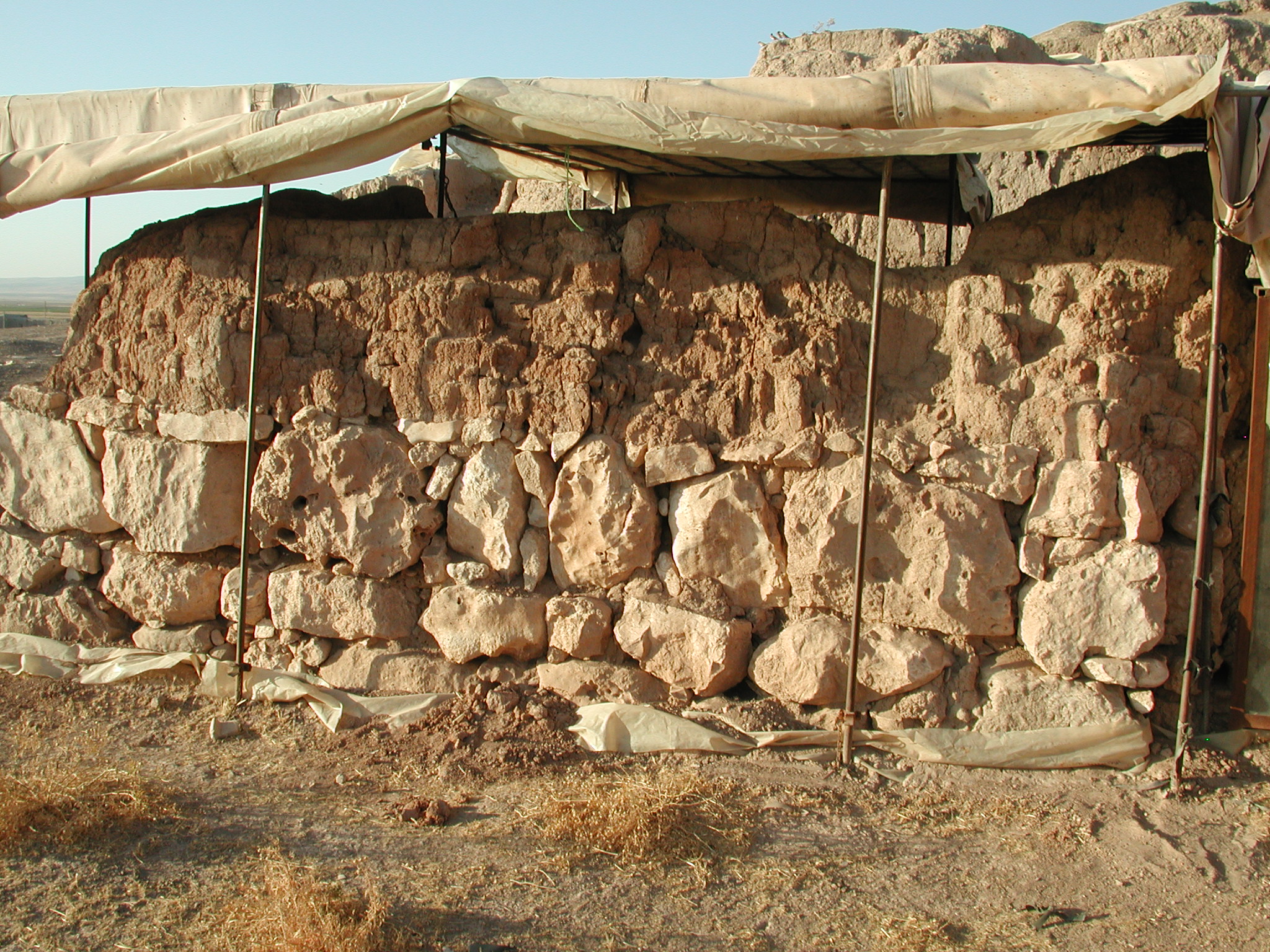 A wall of the Royal Palace
A wall of the Royal Palace
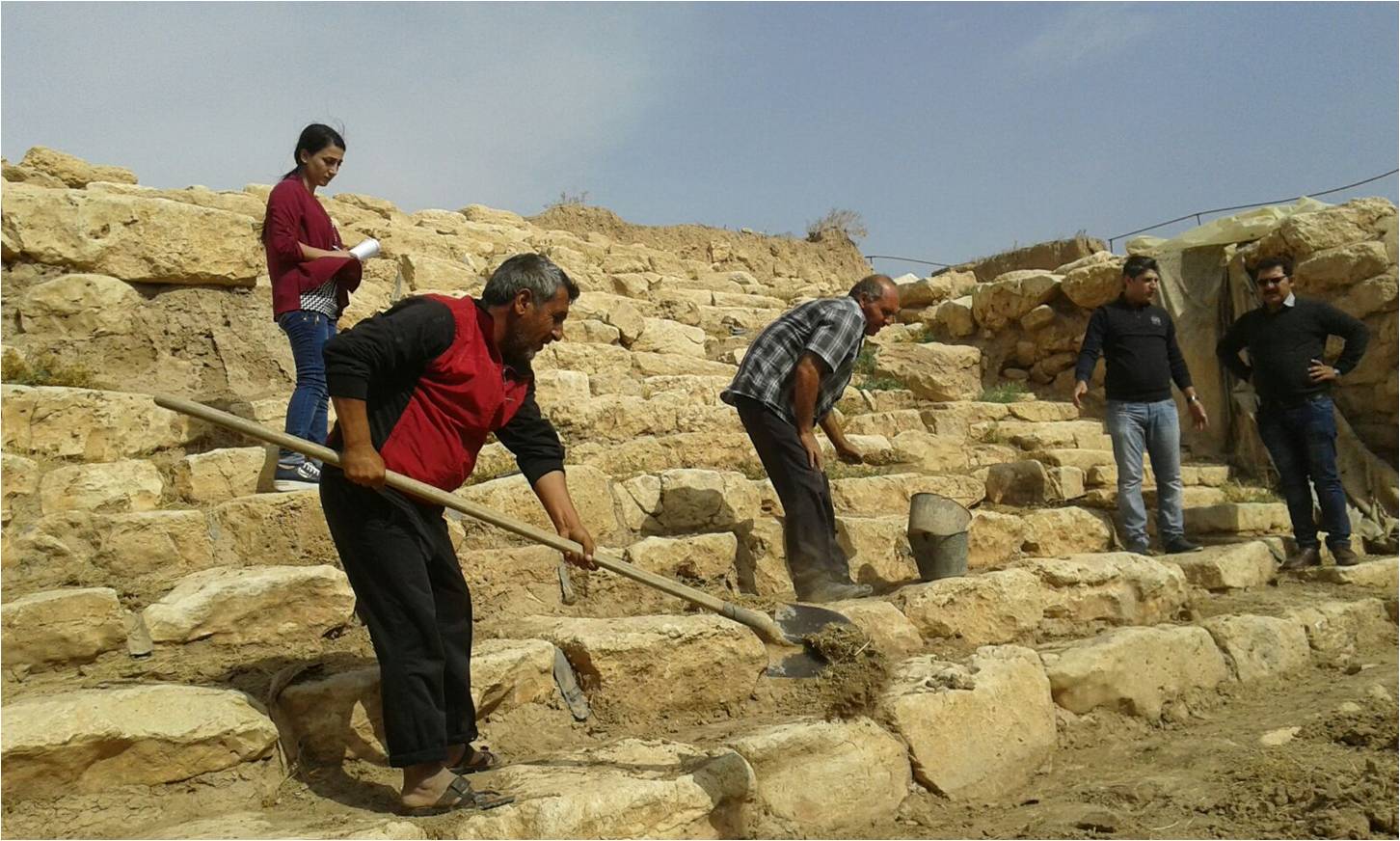 Conservation at Urkesh
Conservation at Urkesh
|
#### March 1, 2024: Lecture of A. Kharobi at Kiel University
"Under the Dust of Tell Mozan: Bioanthropological analysis" {#ZI229_Kiel TO="bioanthropoligical analysis" data-toc-label="March 1, 2024: Kiel"}
The workshop "Bioarchaeology in Mesopotamia" is from February 29 to March 2, 2024. It will bring together international experts in fields such as archaeobotany, zooarchaeology, biological anthropology, geoarchaeology, isotopic geochemistry, and ancient DNA analysis. Through engaging presentations and panel discussions, they will explore the diverse landscapes of ancient Mesopotamia.
You can register via the website to receive the ZOOM link. More information on the website.
Dr. Arwa Kharobi will present a paper (on March 1, 2024) entitled Under the Dust of Tell Mozan: Bioanthropological analysis.
You can download the flyer of the conference at this link.
The whole schedule of the conference is available here. |
|

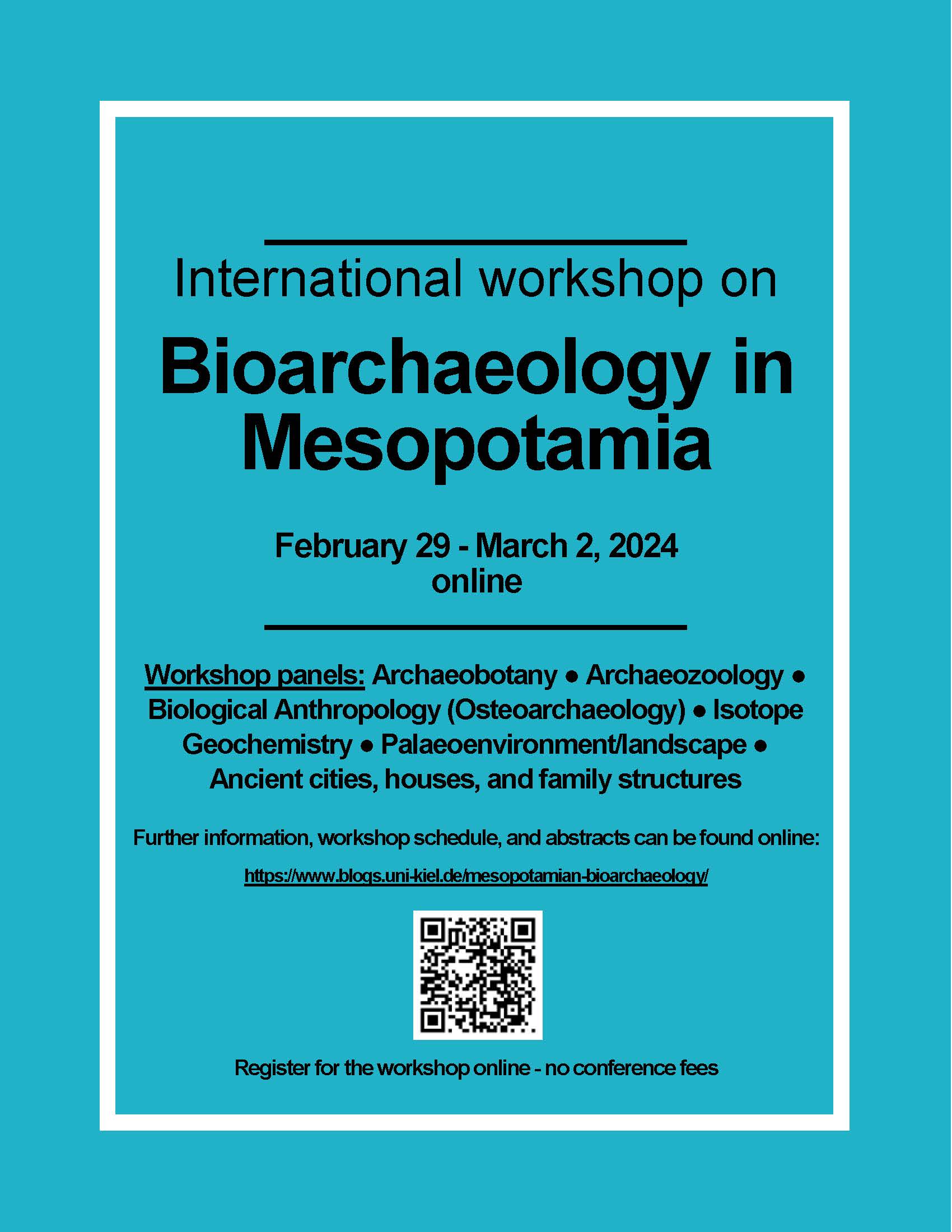 |
#### January 4, 2024: Lecture of G. Buccellati and M. Kelly-Buccellati at the MET
"From clay to silicon: the pride of a lost heritage and a digital innovation" {#ZI104_MET TO="
MET; pride; heritage; digitality" data-toc-label="Jan. 4, 2024: MET"}
In a presentation to the staff of the Ancient Near East Department at the Metropolitan Museum of Art, Giorgio Buccellati and Marilyn Kelly-Buccellati gave a broad review of the two main IIMAS projects – Urkesh beyond Urkesh and Cybernetica Mesopotamica. As members of the Visiting Committee of the Department, and in view of the long standing collaboration between the Urkesh project and the MET, they emphasized especially the conceptual aspects that link our work.
This is particularly pertinent in light of the current work on the renovation, and re-imagination, of the ANE and Cypriot galleries. On the one hand, the Urkesh heritage project echoes the effort to help visitors internalize the values we see in a broken tradition. On the other, our work on websites based on the concept of interplanarity echoes the need to develop a dynamic interrelationship among data and argument, among objects and cultures. |
|
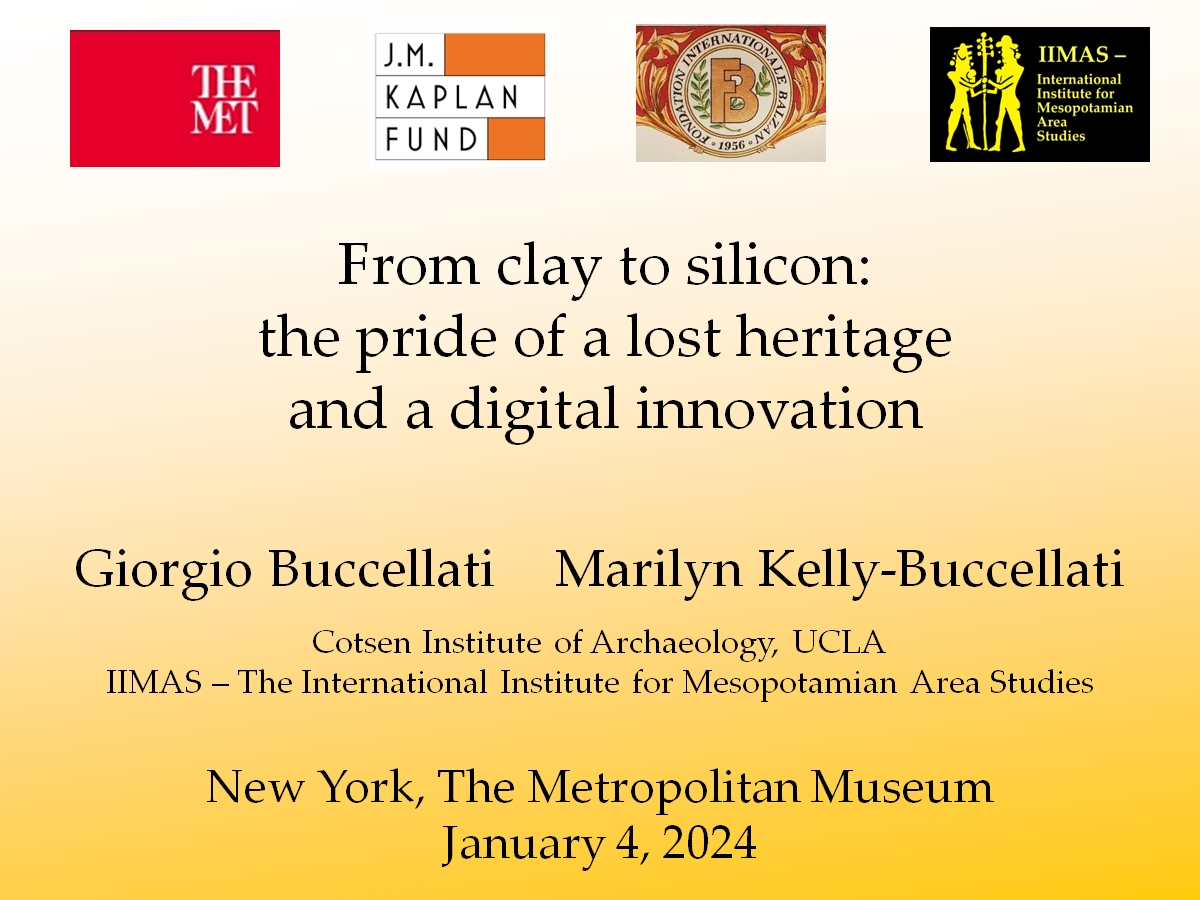 |
## 2023 {#2023}
### September-December 2023
#### November 29, 2023: Conference at "Politecnico di Milano", Mantua Campus {#ZHy29_Mantua TO="Politecnico; beauty" data-toc-label="Nov. 29, 2023: Mantua"}
The "Politecnico di Milano", Mantua seat, has organized, on November 29, 2023, a conference entitled Beauty as a Fundamental Human Right; for a Nation System for Beauty.
Some members of the Urkesh/Tell Mozan team will also take part in the conference:
- 9.45-10.15 AM (CEST): Prof. Giorgio Buccellati ("Framing the Beauty of Heritage")
- 10.15-10.30 AM (CEST): Dr. Yasmine Mahmoud ("A Sense of Wonder")
- 10.30-11.45 AM (CEST): Dr. Hiba Qassar ("The Young Future")
- 10.45-11.00 AM (CEST): Dr. Samer Abdel-Ghafour ("Pride among the Ruins")
The event flyer can be downloaded at this link.
Remote participation is possible via the "Webex" platform, by accessing this link. |
|
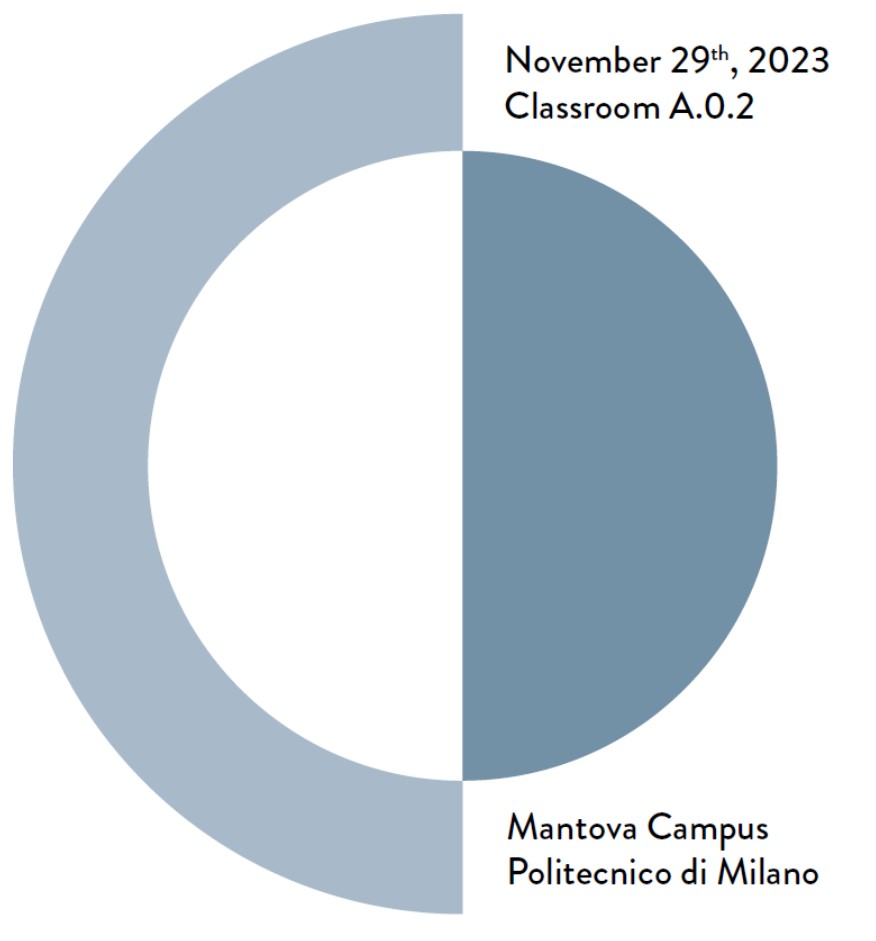 |
#### November 8, 2023: Lecture by H. Qassar in Poitiers {#ZHy8_hQ_Poitiers TO="illicit traffick" data-toc-label="Nov. 8, 2023: Poitiers"}
On November 8, 2023 Dr. Hiba Qassar will deliver a lecture in the economic and social context of illicit trafficking symposium ("ANCHISE"), organized by the University of Poitier and the European University Institute. The symposium is set within the wider framework of the European project "ANCHISE" (Horizon Europe).
Dr. Qassar's participation will be in session one (see program) and will speak about case studies of community archaeology and its role in protecting the archeological sites, highlighting the case of Tell Mozan with other two cases from Egypt and Iraq. |
|
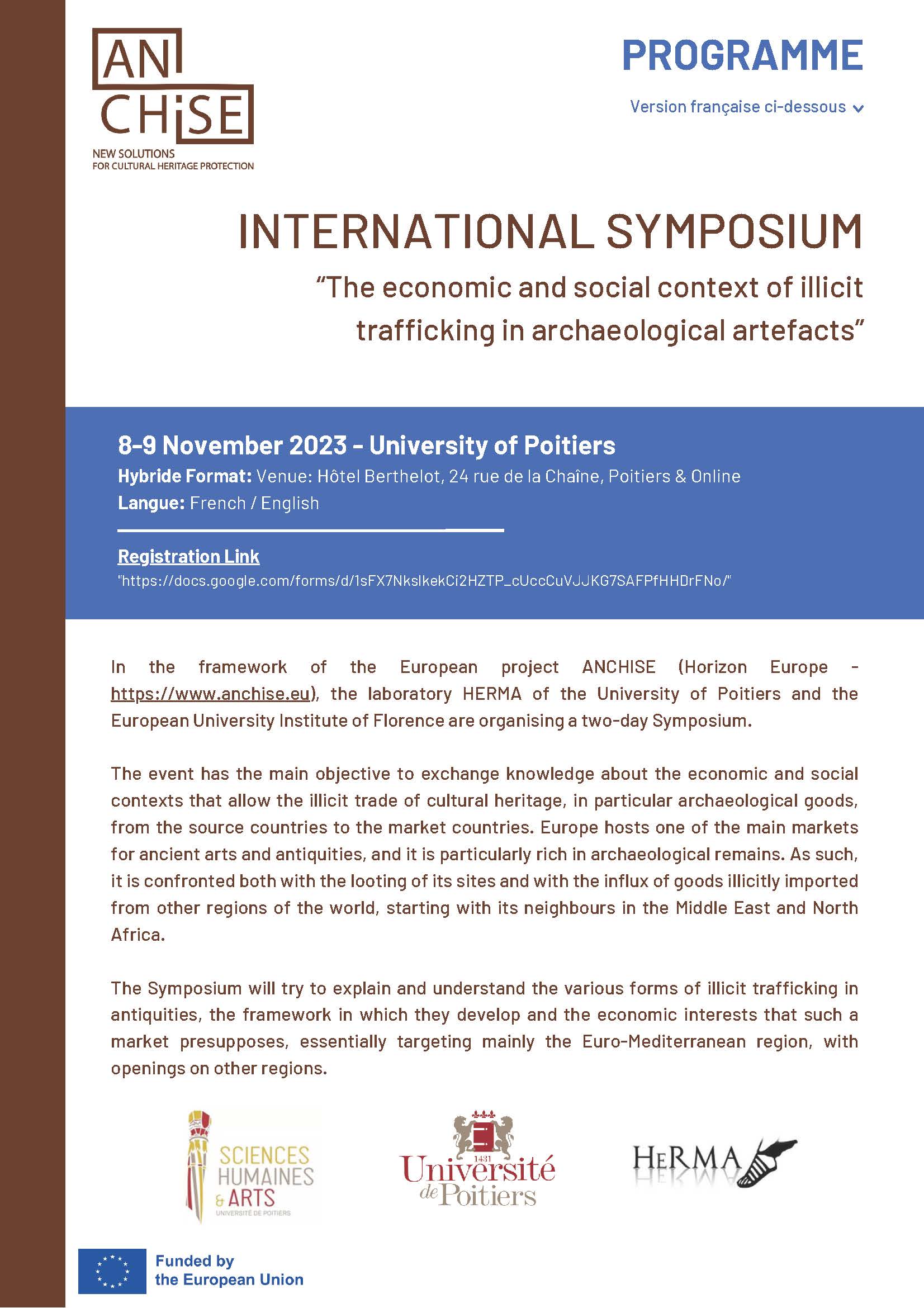 |
### January-June 2023
#### February 22, 2023: Lecture by G. Buccellati and M. Kelly-Buccellati at UCLA
("The dignity of the fragment") {#ZH222_gB-mKB_Dignity TO="
UCLA; dignity; excavation report; fragment; database; narrative" data-toc-label="Feb. 22, 2023: UCLA"}
On February 22, 2023, Giorgio Buccellati and Marilyn Kelly-Buccellati present a lecture at UCLA on the topic: "The dignity of the fragment. Web based excavation reports between database and narrative."
The abstract of the lecture is available at this link. |
|
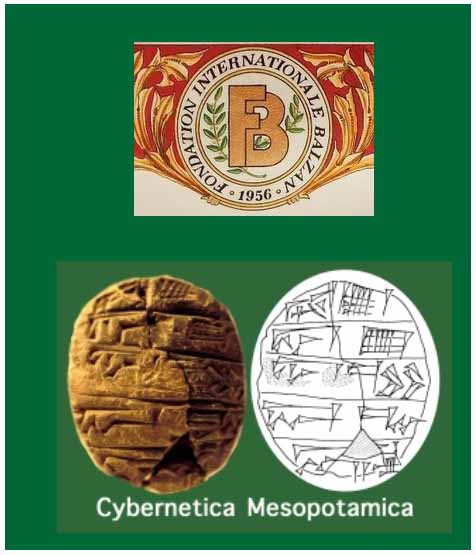 |
#### February 14, 2023: Lecture by G. Buccellati at UCLA
("At the origins of monotheism") {#ZH214_gB_Monotheism TO="
UCLA; monotheism" data-toc-label="Feb. 14, 2023: UCLA"}
On February 14, 2023, Giorgio Buccellati delivers a lecture at UCLA (within a series of conferences organized by the Center for the Study of Religion) entitled "At the origins of monotheism: A Socio-economic Confrontation in Ancient Syro Mesopotamia."
The flyer of this event can be downloaded at this link.
The abstract of this conference is available at this link. |
|
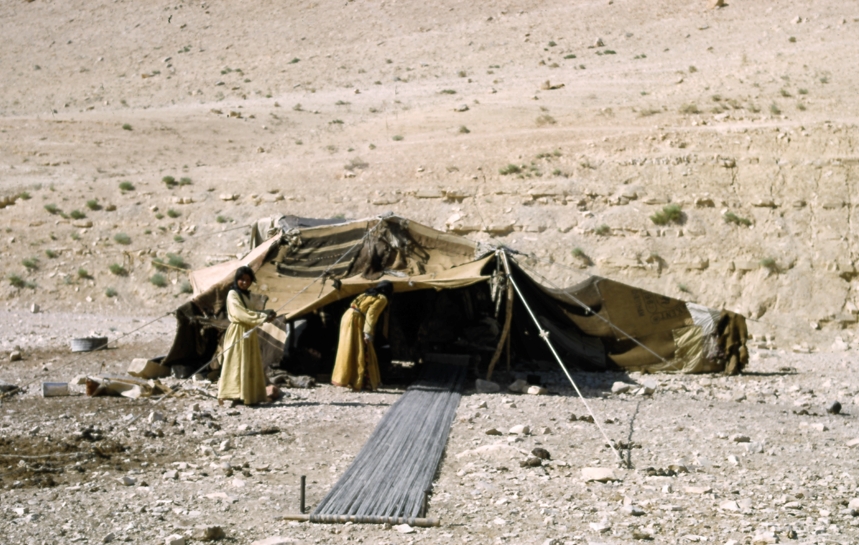 |
## 2022 {#2022}
### July-December 2022
#### October 26, 2022: Lecture by G. Buccellati (workshop
Wisdom Between East and West) {#ZGx26_Turin TO="wisdom" data-toc-label="Oct. 26, 2022: Turin"}
On Wednesday, October 26, 2022, at 10:15 AM (CEST), Prof. Giorgio Buccellati delivered a lecture within the workshop Wisdom Between East and West: Mesopotamia, Greece and Beyond, organized at the University of Turin (on October 26-27), at "Palazzo Nuovo".
Prof. Buccellati's lecture was entitled An Epistemological Perspective on the Mesopotamian Wisdom Tradition.
The flyer of the workshop is available at this link. |
|
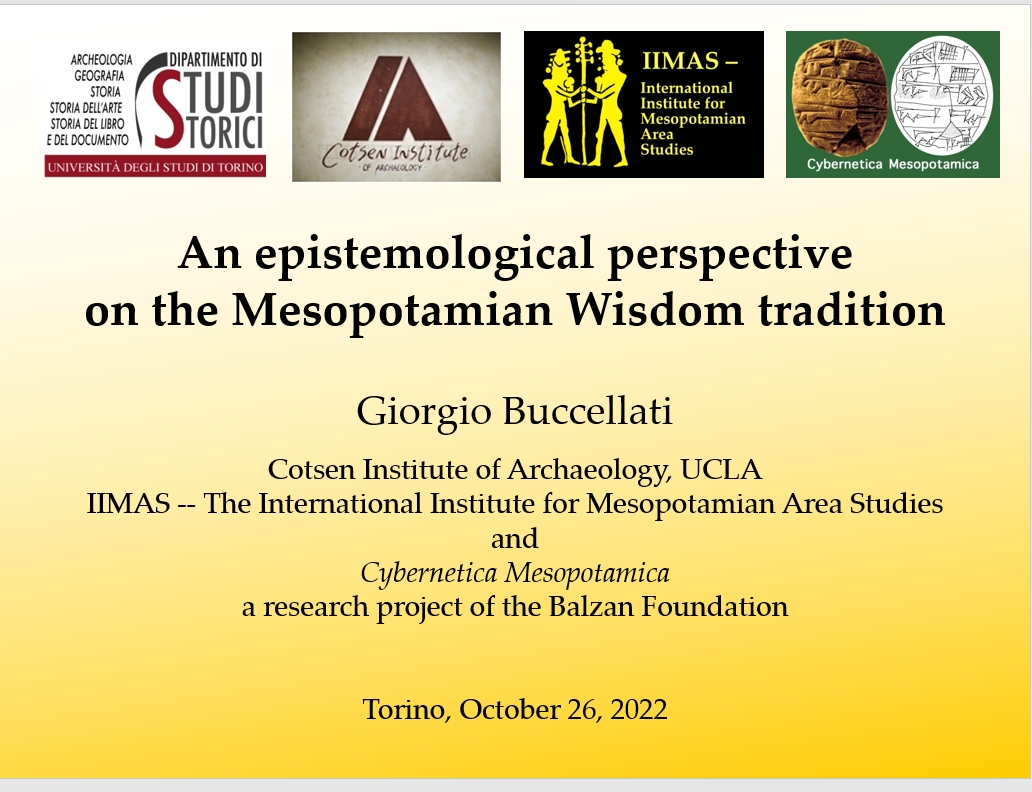 |
#### September 22-24, 2022: Lectures at the
Melammu Symposium {#Graz_Melammu TO="civilization(s)" data-toc-label="Sep. 22-24, 2022: Graz"}
During the "15th Symposium of the Melammu Project", entitled Clash of Civilizations? Sedentary and non sedentary populations (organized in Graz, on September 21-24, 2022, at the University of Graz, Institute of Classics), Prof. Giorgio Buccellati and Prof. Marilyn Kelly-Buccellati delivered two lectures.
The symposium has been organized by Prof. Laerke Recht and other colleagues of the University of Graz.
Prof. Marilyn Kelly Buccellati presented, on Thursday, September 22, a lecture entitled "Identity and alterity: Hurrian Urkesh facing the Akkadian imperial expansion".
On Saturday, September 24 (09:30-11:30 AM, CEST), Prof. Giorgio Buccellati offered a keynote lecture about "Polytheism vs. monotheism – A socio-epistemic culture clash".
The flyer of the symposium is available at the following link.
Program.
Brief notice. |
|
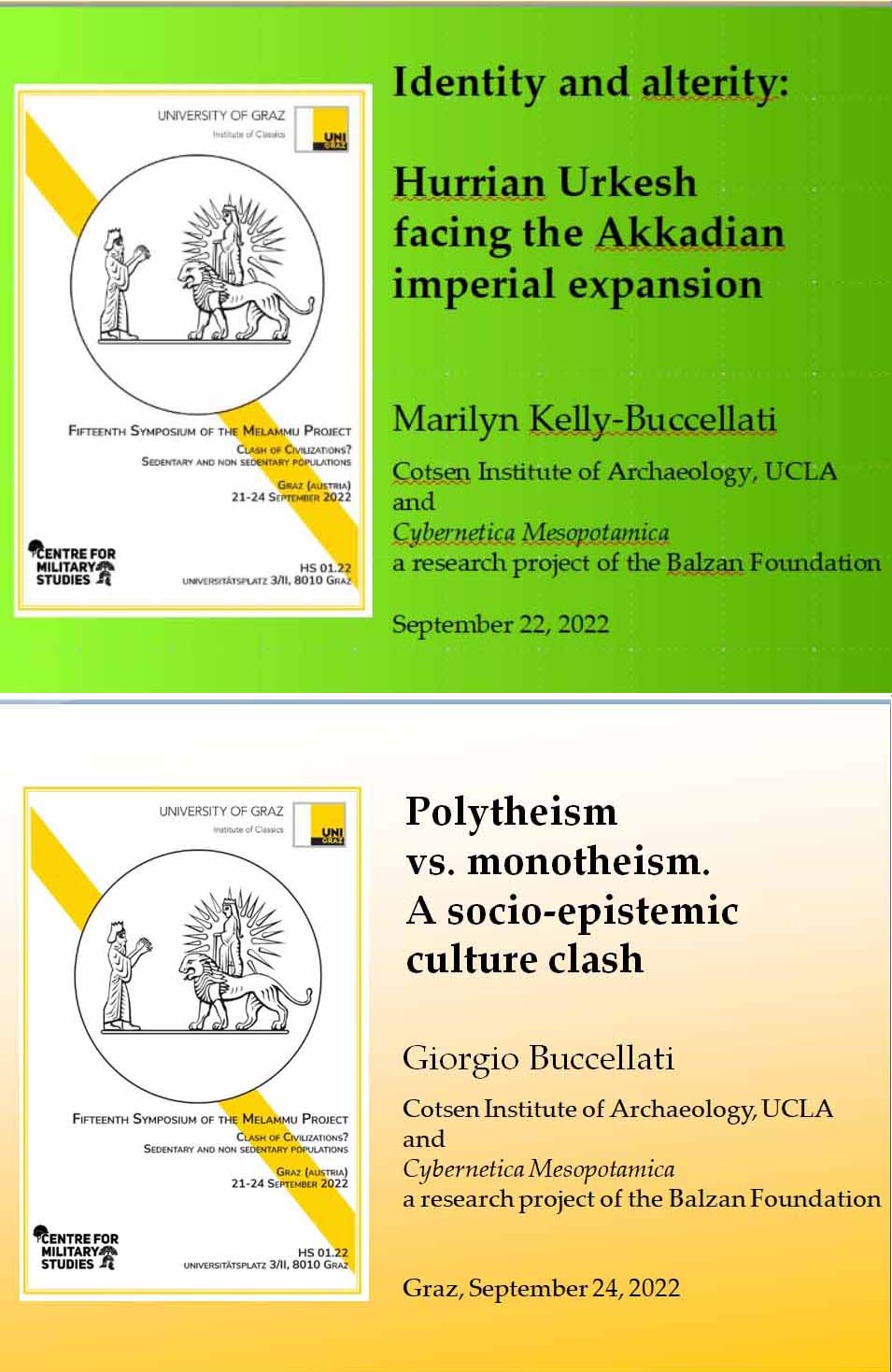 |
### January-June 2022
#### May 4-5, 2022: Lectures at the congress
Humanism and Digitization {#Milan_UNICATT TO="
UNICATT; humanism; digitization" data-toc-label="May 4-5, 2022: Milan"}
May 4-5, 2022: the "Università Cattolica del Sacro Cuore" in Milan (Italy) organized a congress entitled Humanism and Digitization: Theory and Practical Achievements, focused on a dialogue between scholars of different fields discussing about the relationship between "humanism" and "digitization", considering digital humanism under a philosophical, archaeological, historical, and technological perspective.
On the second day (Thursday, May 5), the focus was concentrated on the discussion of practical applications of technology and digitality to archaeology, moving from a round table on Giorgio Buccellati's volume A Critique of Archaeological Reason (Cambridge University Press 2017).
At this venue, on May 4, Prof. Giorgio Buccellati gave a lecture on the topic "Umanesimo digitale. I frammenti in-discorso con il tutto"; on May 5, Prof. Giorgio Buccellati and Prof. Marilyn Kelly-Buccellati presented a paper entitled "Digitalità naturale dell'archaeologia".
The flyer of the congress can be downloaded here. |
|
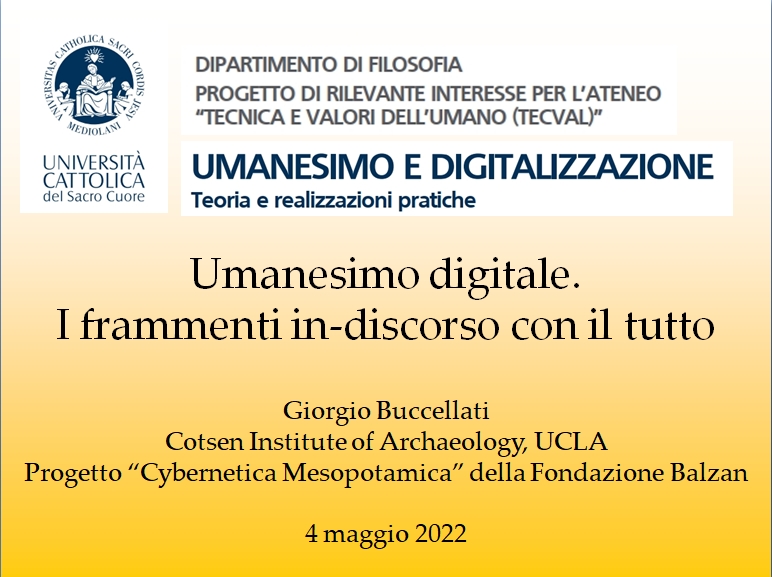
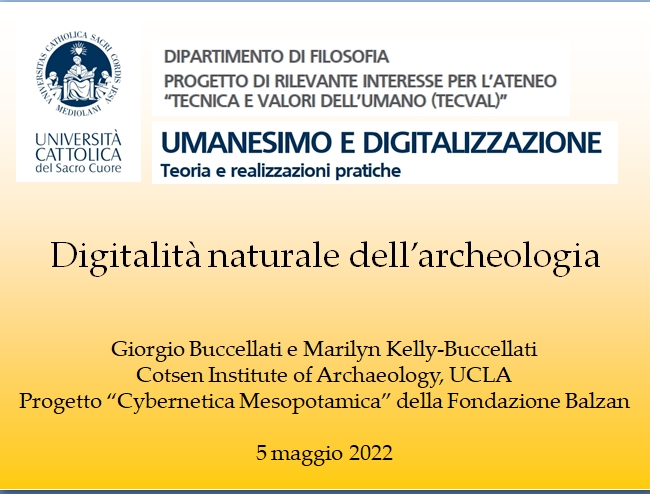 |
## 2021 {#2021}
### July-December 2021
#### November 16, 2021: Conference at
Politecnico, Milan {#ZFy16_Politecnico TO="Politecnico; digital discourse;
Four Banks Project;
Urkesh Global Record (UGR);
UGR" data-toc-label="Nov. 16, 2021: Milan"}
On November 16, 2021 the Politecnico of Milano (Piazza Leonardo da Vinci, 26) organized a conference in the form of round table entitled "A Multi-Linear Digital Discourse in Theory and Practice: The Urkesh Global Record and the Four Banks Project", focusing on the new possibilities offered by a systematic and digital publication of the archaeological record (Urkesh Global Record) of the excavations at Urkesh/Tell Mozan, along with the digital publication of material included in the vademecum to the volumes pertaining to the "4Banks" project.
The flyer of the conference can be downloaded here. |
|
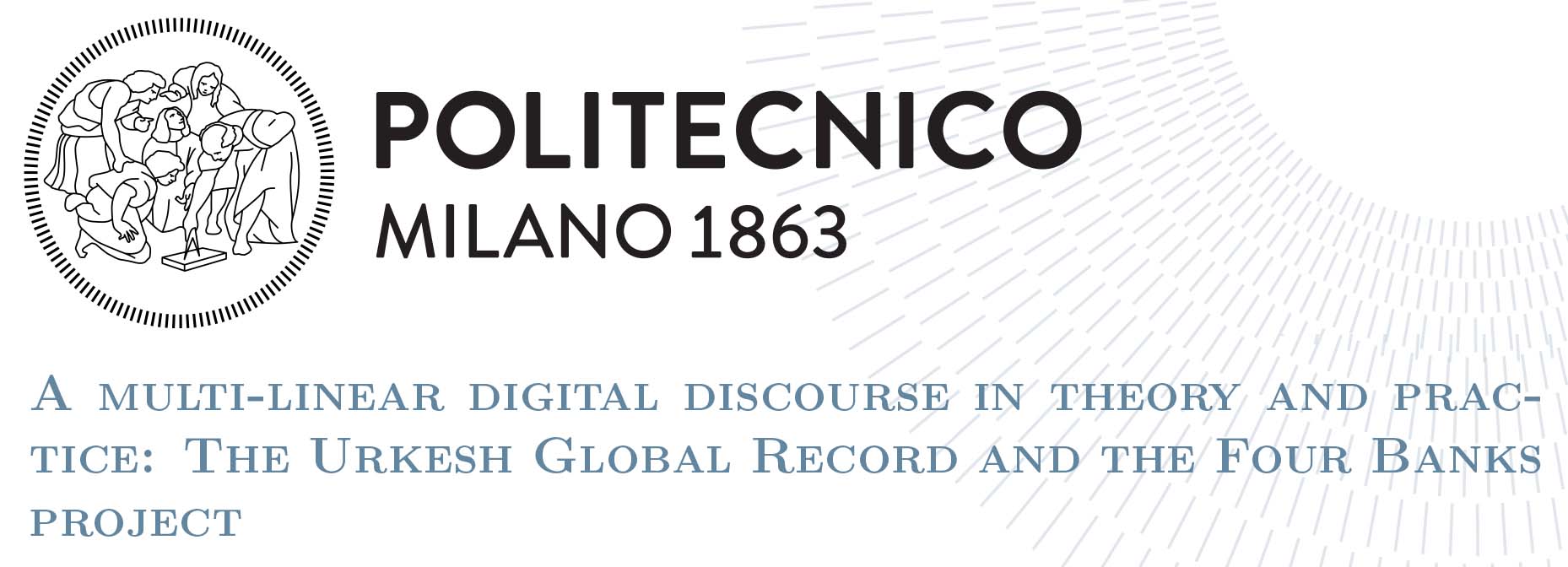 |
#### September 24, 2021: Lecture by Jonah Lynch (EADH 2021) {#ZF924_Lynch TO="digitali humanities; network analysis; structural comparison of religion; religion; graph representation; digital approach" data-toc-label="Sep. 24, 2021: EADH"}
On September 24, 2021 (Friday), Dr. Jonah Lynch (IIMAS Research Associate and PhD student at University of Pavia, Italy) presented a fascinating contribution in the context of the European Association for Digital Humanities (EADH) 2021 Conference; the title of his talk is "Graph representation and network analysis as a comparative tool: a case study in comparative religion" (session Long and Short Papers: Content Analysis/Visualization): a new digital approach in investigating, analyzing, and visually displaying patterns of religion (focusing on Israel and Mesopotamia) in a digital and structural comparative view.
The program of the conference is available online.
A video ("Structural comparison of religion") describing Dr. Lynch's ongoing research can be found on his YouTube personal channel. |
|
 |
#### September 22, 2021: Lecture by Giorgio Buccellati and Marilyn Kelly-Buccellati (Madrid) {#ZF922_Madrid TO="Madrid; digital discourse; multi-linear narrative" data-toc-label="Sep. 22, 2021: Madrid"}
On September 22, 2021 (Wednesday), Prof. Giorgio Buccellatia and Prof. Marilyn Kelly-Buccellati delivered a lecture on new approaches on investigating Mesopotamian and biblical religion. The central idea is to show how a "blank" site can serve a purpose that goes beyond the standard of providing information in the form of databases. It is the notion of "digital discourse", that makes the most of the potential of the digital medium by implementing a multi-linear narrative. The approach (proposed by G. Buccellati in A Critique of Archaeological Reason, Cambridge 2017, with companion CAR "blank"site) will be exemplified through three "blank"sites to be illustrated in the first part of the round table. Respondents will then consider the proposal from three different points of view.
The flyer of the conference is available online.
An interview to Prof. Giorgio Buccellati and Prof. Marilyn Kelly-Buccellati, granted after this conference, can be read at the following link. |
|
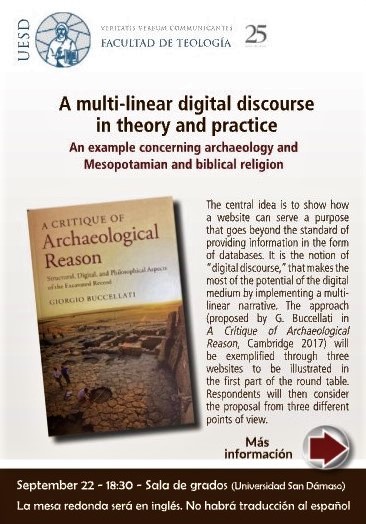 |
#### September 7, 2021: Lecture by A. Kharobi;
The UGR: Overview and Zoom on the Bioanthropogical Data {#ZF907_UGR TO="bioanthropoligical analysis" data-toc-label="Sep. 7, 2021: Kiel"}
On September 7, 2021, Dr. Arwa Kharobi presented a paper entitled "The Urkesh Global Record (UGR): Overview & Zoom on the Bioanthropological Data" at the "27th Annual Meeting of the European Association of Archaeologists" (Widening Horizons), held in Kiel, during September 6-11, 2021.
The PDF of the presentation is available at this link. |
|
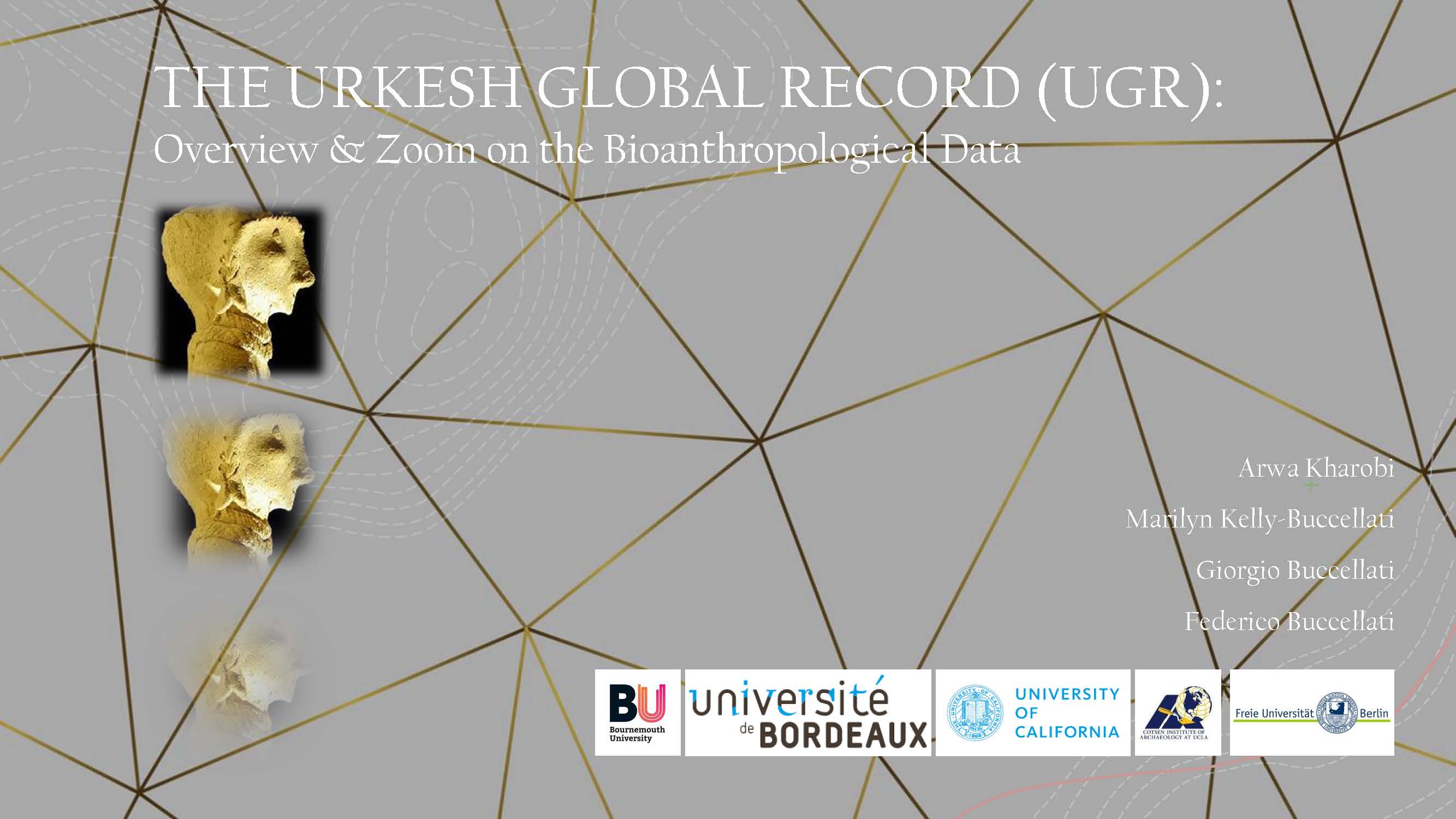 |
## 2017 {#2017}
### July-December 2017
#### December 8, 2017: Lecture at the Shanghai Archaeological Forum {#ZBz08_Shanghai TO="Shanghai Archaeological Forum;
Archaeology for a Young Future" data-toc-label="Dec. 8, 2017: Shanghai"}